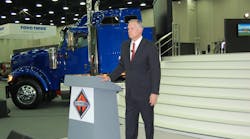Reducing structural and warranty costs while increasing not just market share but profitable market share are but some of the stepping stones Navistar believes will be critical to restoring both its position and its long-term health as a truck OEM.
In an interview with reporters last week at the company’s Lisle, IL, headquarters, Bill Kozek, Navistar’s president of North American trucks & parts, explained that leaner lower-cost manufacturing, profitable market share growth, improving financial metrics and – above all – more vehicle uptime for customers remain the four critical pillars of the OEM’s effort to restore itself within the U.S. truck manufacturing industry.
“Our industry is extremely competitive; it’s a dog fight out there,” Kozek said. “But we’re continuing to show an improvement in our products and as a result our business in coming back; quicker in Class 6-7 than Class 8, but that’s because we want to grow market share profitably, not just do deals to do deals.”
He added that overall revenues for Navistar were up to $2.7 billion for the second quarter versus $2.5 billion in the same period for 2013, with the company generating adjusted $82 million in earnings before interest, taxes and appreciation, and one-time charges. More importantly, Kozek said Navistar cut its structured costs by $92 million and slashed warranty costs by $23 million or 13% year-over-year.
Still, the company lost $119 million in the second quarter one $151 million in intangible asset impairment charges, $42 million in pre-existing warranty adjustments and $8 million in restructuring charges were added in, according to its second quarter earnings statement.
“These warranty charges continue to plague us but they are moving in the right direction,” Kozek stressed.
Kozek also pointed out that company’s order rate is up 30% thru the end of May this year compared to the same period in 2013, some 33,998 truck orders versus 26,162, respectively.
In terms of switching the OEM’s truck portfolio over from its exhaust gas recirculation (EGR) only engine technology to selective catalytic reduction (SCR) systems, Kozek said that the company’s medium-duty models should be fully transitioned by the end of this year, with its severe service models fully switched by 2015. The changeover for Navistar’s Class 8 line wrapped up late last year.
He also stressed that truck demand going forward won’t be characterized so much by the “style” of truck – such as a daycab, sleeper, etc. – as it will be by specific features, component, and sub component type; one reason Navistar keeps planning to expand the menu of options for its truck models.
“At the end of the day for customers, it’s about specific component availability – aerodynamic options, lightweight options, automatic transmission options, 6x2 axle configurations, disc brakes, etc.,” Kozek said. “Good fuel economy is really just the point of entry now. Hat we need to do is supply a customer with the options they want while giving them the lowest possible operating cost and maximum possible uptime.”



